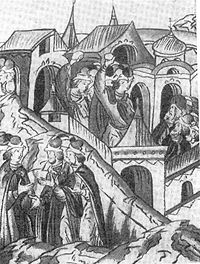.gif)
Fire of Moscow (1547)
Encyclopedia

Ivan IV of Russia
Ivan IV Vasilyevich , known in English as Ivan the Terrible , was Grand Prince of Moscow from 1533 until his death. His long reign saw the conquest of the Khanates of Kazan, Astrakhan, and Siberia, transforming Russia into a multiethnic and multiconfessional state spanning almost one billion acres,...
was officially crowned as first Tsar
Tsar
Tsar is a title used to designate certain European Slavic monarchs or supreme rulers. As a system of government in the Tsardom of Russia and Russian Empire, it is known as Tsarist autocracy, or Tsarism...
of Russia
Russia
Russia or , officially known as both Russia and the Russian Federation , is a country in northern Eurasia. It is a federal semi-presidential republic, comprising 83 federal subjects...
. The fire swept into the Kremlin and blew up the powder stores in several of the Kremlin's towers.
The fire displaced
Forced migration
Forced migration refers to the coerced movement of a person or persons away from their home or home region...
about 80,000 people and killed about 2,700 to 3,700 (not including children), and led to widespread poverty
Poverty
Poverty is the lack of a certain amount of material possessions or money. Absolute poverty or destitution is inability to afford basic human needs, which commonly includes clean and fresh water, nutrition, health care, education, clothing and shelter. About 1.7 billion people are estimated to live...
among the survivors. Metropolitan Makarii was apparently injured in the fire when the Cathedral of the Dormition in the Kremlin was threatened by the flames and the metropolitan was taken out through a breach in the Kremlin walls and let down by rope into the Moscow River. He may have never fully recovered from his injuries, although he lived another 16 years.
The Muscovites put the blame on the tsar's maternal relatives from the Glinski family. A rebellion began and Yuri Glinski was stoned
Stoning
Stoning, or lapidation, is a form of capital punishment whereby a group throws stones at a person until the person dies. No individual among the group can be identified as the one who kills the subject, yet everyone involved plainly bears some degree of moral culpability. This is in contrast to the...
to death inside the Cathedral of the Dormition in front of a horrified Metropolitan Makarii. Yuri's brother, Mikhail Glinski attempted to flee to Lithuania
Lithuania
Lithuania , officially the Republic of Lithuania is a country in Northern Europe, the biggest of the three Baltic states. It is situated along the southeastern shore of the Baltic Sea, whereby to the west lie Sweden and Denmark...
but failed, and his mother, Anna - the tsar's grandmother - was accused of using sorcery to start the fire. The rebellion resulted in the fall of the Glinski party and eventually strengthened the positions of the young tsar, although he did not hand his grandmother over to the mob as they demanded.

